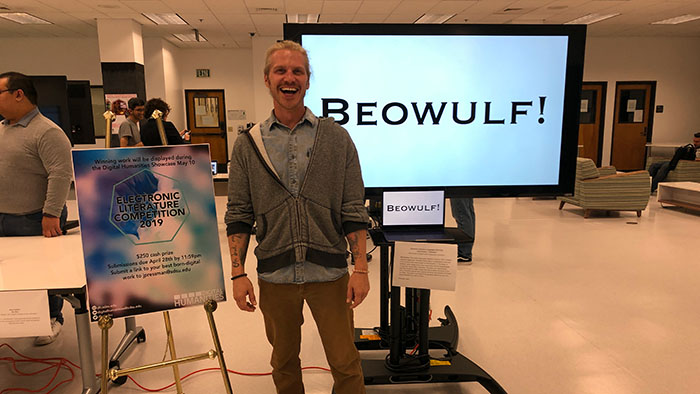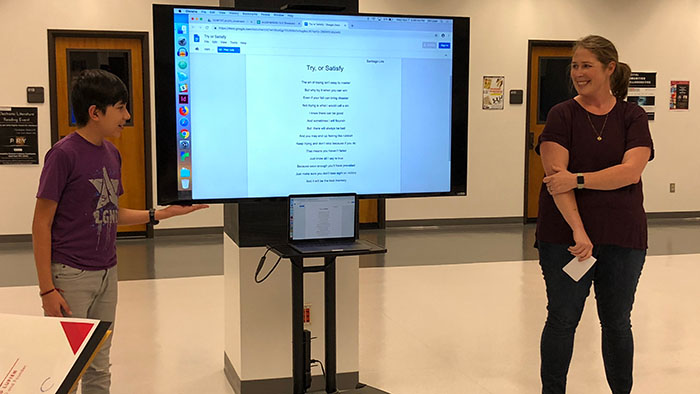Electronic Literature

Electronic literature (E-Lit) is born-digital, made on the computer and read on the computer so that its computational processes are part of its poetics. From Flash poetry to Augmented Reality, Interactive Fiction to hypertext, games to Netprov, E-Lit encompasses a wide variety of efforts to employ new media to create literary art. E-Lit is one of our central programming missions within DH@SDSU.
We have a successful track record of impactful E-Lit programming at SDSU, much of which is inspired and led by SDSU students.
Learn more about our annual E-Lit student competition
Our ongoing E-lit programming includes:
- Annual student competition in electronic literature: to support the development of E-Lit at SDSU, we invite submissions from students across campus and award a cash prize. Work is showcased at the annual DH Showcase in May.
- Tools workshops: to support student experimentation in digital poetics, DH@SDSU regularly offers workshops in free, accessible digital storytelling programs (including Twine and Scalar), often taught by students and former students who have mastered the tools and produced E-Lit within them.
- Workshops: we regularly offer workshops geared towards making E-Lit, often taught by Professor Mark Marino (USC), an award-winning writer and scholar of E-Lit. In the audio realm of digital storytelling, Dr. Pam Lach regularly provides lessons and support for podcasting.
- Lectures: We have a strong track record of bringing cutting-edge E-Lit writers to campus to speak about their work (Caitlin Fisher, Tender Claws, M.D. Coverly, Porpentine, Eran Hadas, and more) as well as scholars working in the emergent academic field of E-Lit (David Ciccoricco, Liz Losh, Noah Wardrip-Fruin, and more).
- E-lit Studio: This space hosts a library of electronic literature, a computer for engaging with older E-Lit pieces, and a curriculum for teaching E-Lit. The E-Lit studio is in the process of being reimagined and renovated, led by graduate students and jumpstarted in Spring 2025!
We also experiment in pilot programming, following the interests and efforts of our student leaders.
- In 2018 we partnered with arc, a California-based organization that runs after school and experiential education programs, to teach E-Lit and critical digital literacy to our larger community. Led by a group of dedicated SDSU graduate students, this program created an after-school electronic literature curriculum for local high school students and culminated in a showcase of student work at SDSU’s DH Center. Read about our partnership with the arc program.
- In late Fall 2019, led by graduate student Jared Zeiders, we opened the E-Lit Studio in the DH Center. This space hosts a library of electronic literature, a computer for engaging with older E-Lit pieces, recommended readings, and an Atari 2600 console.
- In Spring 2022, we piloted a strategic effort to strengthen experimentation in E-Lit on campus– bringing E-Lit education to classrooms and small group workshops, led by MFA students Brent Ameneyro, our first-ever DH E-Lit Programs Assistant.
- In Fall 2024, led by graduate student Joey King, we revisioned the E-Lit Studio by organizing its content around a central work of literature: Shelley Jackson’s pioneering hypertext, Patchwork Girl (1995). We developed curriculum and content to support the reading and teaching of this important, and difficult, work and make its teaching a cornerstone of E-Lit in DH@SDSU.

For more about electronic literature—the art, the academic field, and the global community—visit the Electronic Literature Organization’s homepage.
To learn more about E-Lit @ SDSU or to get involved in leading programming, contact DH@SDSU Co-Founder Dr. Jessica Pressman, Professor, Department of English and Comparative Literature.

